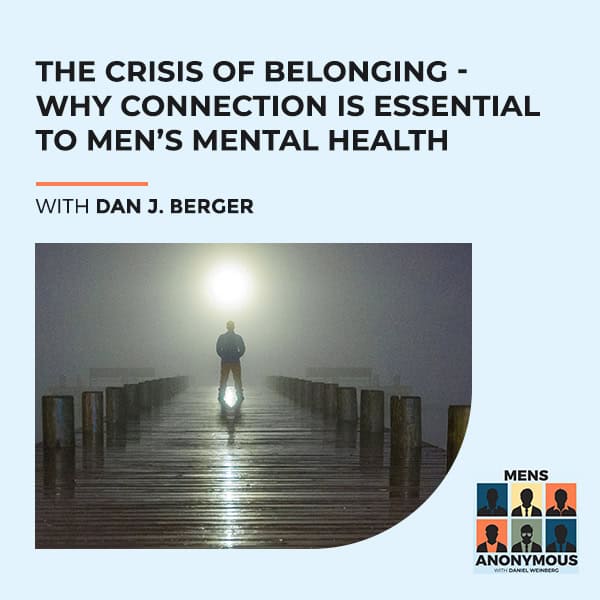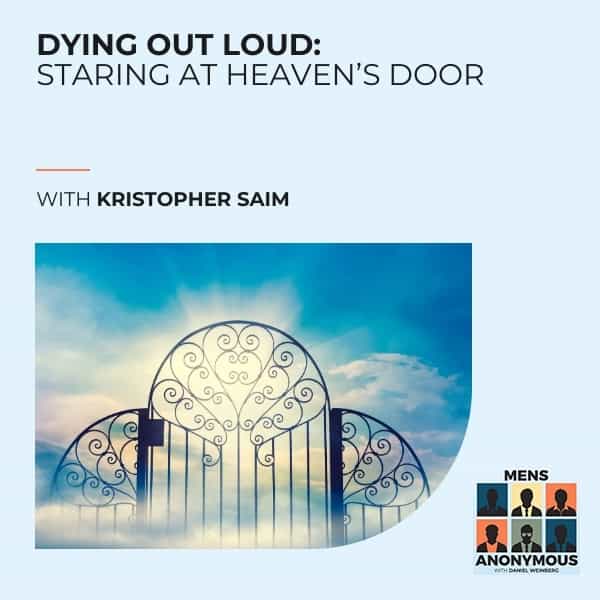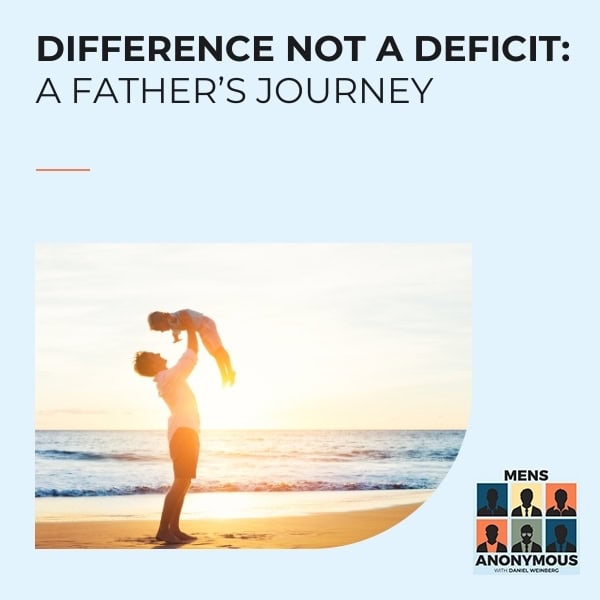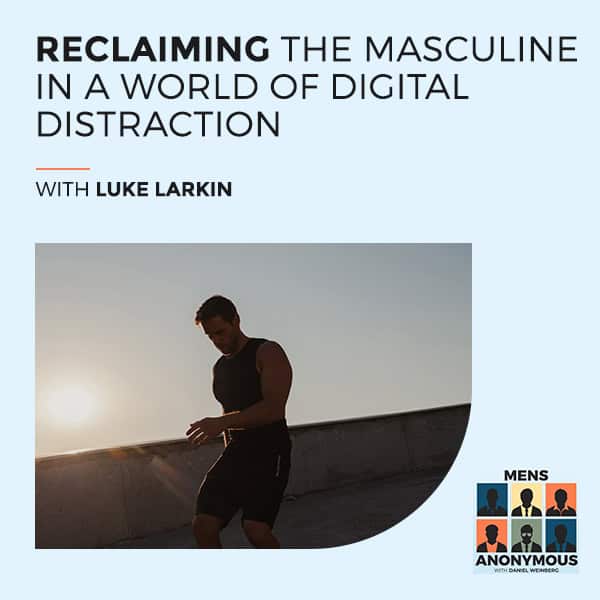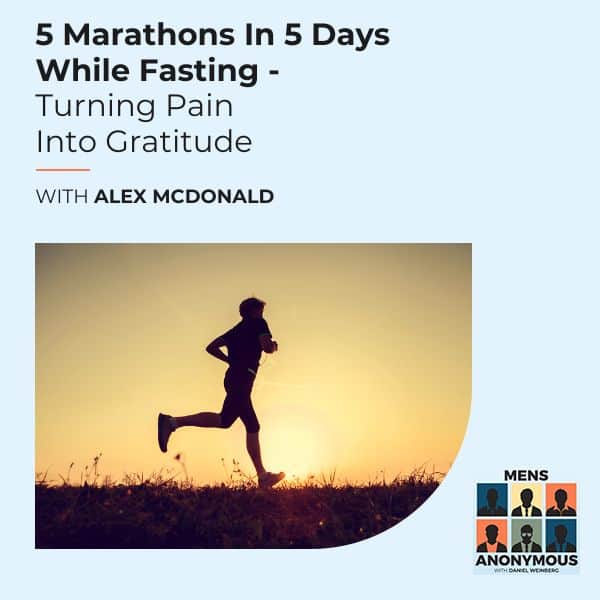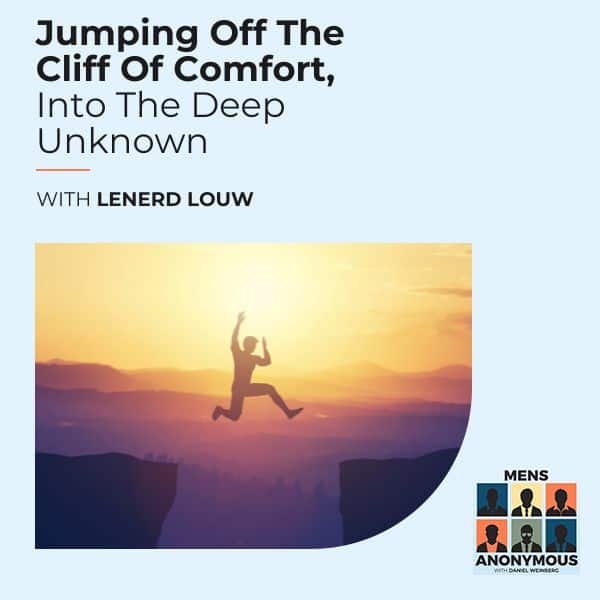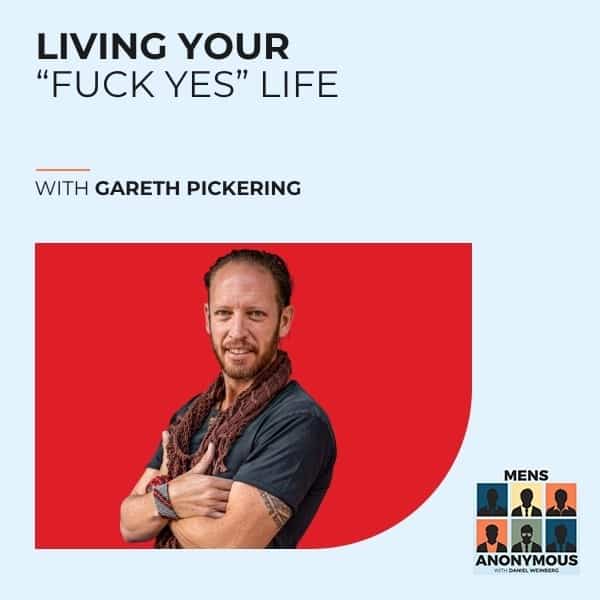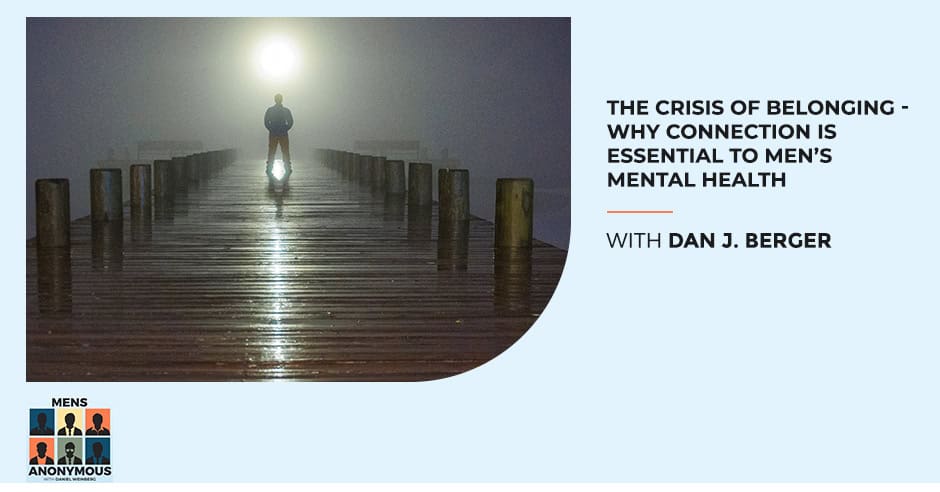
With men pressured to be strong and invulnerable at all times, they often find themselves lost and isolated. They are constantly searching for a true sense of belonging, and this pursuit creates negativity within themselves and in their relationships. Dan J. Berger, author of The Quest and CEO of Assemble Hospitality Group, joins Daniel Weinberg to discuss his concept of belonging intelligence. He explains how to identify your belonging archetype to determine the right place to be and the right connections to build. Dan also emphasizes the importance of loving yourself, actively seeking out supportive communities, and going against social constructs to escape the harsh grip of loneliness.
—
Listen to the podcast here
Dan J. Berger
On this show, we speak to Dan J. Berger, author of The Quest, where we go deep on the concept of belonging and intelligence, and discuss men’s loneliness and isolation crisis. Sit back and read this very interesting conversation around what’s happening with men in society.
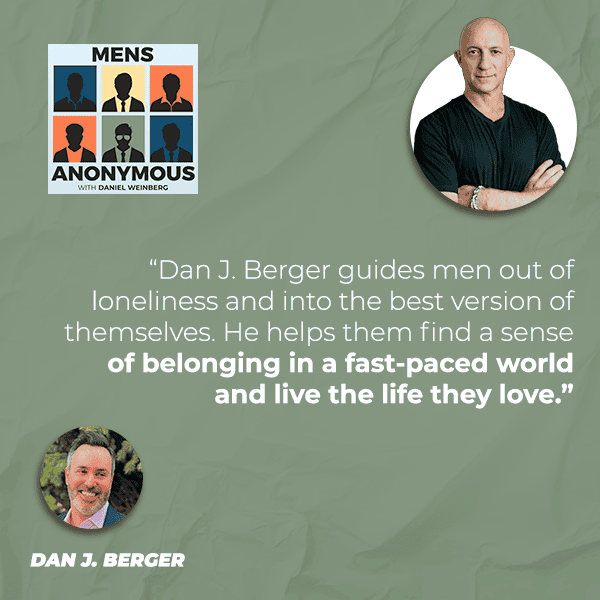
Dan, it’s good to have you on the show.
Thank you so much for thinking about me.
Where are you in the world?
I am in the world where I usually am these days and that’s Boise, Idaho.
Dan’s Life Journey And Writing The Quest
Let’s get in to it. You are the writer of this incredible book called The Quest, which is fascinating, but before you became a book writer, give us the journey. How did you transitioned into putting something like that out in the world?
I wish I had an easy answer. The real answer is that I had this gap in my life. The gap happened like most people. I hate telling this part of the story because I feel like another tech bro, but the truth is, not like most tech bros, after I had an exit in 2018 and then left the company at 2019, and that was Q4. COVID hit Q1 of 2020. Between COVID, Q1 of 2020, and call it three years after that, I had a ton of time.
I didn’t know what I was going to do next, and I thought to myself, “I know my next thing will be related to community.” I was in the process of buying Meetup.com, which some of the readers may know. It’s this internet brand that initially introduced the first marketplace for affinity groups. That deal fell through, but I knew it was going to be around the community. I was going to maybe build a competitive platform.
I wanted to do things backwards instead of becoming a thought leader, for lack of a better word, on the subject of community or belonging eventually is what I would call it. I thought, “Let me publish the book first and then build credibility and then build my next thing.” What I realized at my last company is that I became the best brand person, the best spokesperson for my company. I then thought, “Let me do it backwards. Become the brand, the become the spokesperson, and then build the company.” That was the first reason.
The idea of the book, though, did you know what you wanted to write? How did you come to piecing all this together? It’s quite a puzzle you put together.
I imagine many people are thinking and community belonging. I see it. The reality is that when I started peeling the onion, I started thinking, “Why is community important to me?” I realized it’s because it gives me a sense of belonging as we will probably discuss later on. I’m the belonging archetype or persona that likes communities and needs communities in order to feel a sense of belonging.
As I was peeling the onion and I was thinking, why is community important to me? I realized it’s because it gave me a sense of belonging, and my whole life I have been chasing this sense of belonging because of what I experienced in my early childhood. When I say early childhood, I’m talking specifically in the years that contribute to our development, which is before the age of twelve. What I realized as I peel this onion further, I like community, missing a sense of belonging, and then it’s like, why am I missing a sense of belonging? Why am I chasing communities to feel a sense of belonging? The answer was is that I was belonging less most of my life for four decades.
What does that mean? What did something particular happen to you in your life? You’re saying that this is almost like a general thing that happens to people.
One of the things I like to mention when I delve into the topic of traumas, which I will get to in a second, is that everybody’s pain is at a maximum. What I mean by that is if I poke you and you’ve never had more pain than poking, then your poking is a maximum, but if somebody had experienced assault when they were younger, that’s probably their maximum.
Everybody’s pain is a maximum. Share on XEverybody’s pain is at a maximum, and the idea of trauma competition is, “I experienced this and I experienced this.” That’s not conducive to a meaningful conversation. When I say belonging less I mean that I endured belonging traumas that made me feel like I don’t belong, and there are three of them. The first one is adoption. From the moment when I was in the womb after conception, my biological mom decided to give me away.
Through those nine months, I was getting the message that I don’t belong with her and therefore, with her family. That was the first belonging trauma. When people go through that, they essentially miss out on having a biological nuclear family, especially with a father finger who had left my mom. We now know that we need a strong family unit for healthy upbringing.
The second belonging trauma was the fact my dad left us when I was two, my adoptive dad. My parents were married and they adopted me. They waited almost a decade to adopt me. By the time I came along, my father wasn’t interested anymore and my mom wanted him to go do something else. This nuclear family that I was brought into disappeared very quickly and I was raised by a single mom.
The third and the final belonging trauma is immigration. I moved to the United States from Israel when I was nine. I went from a very active social life having my tree house and a close group of friends who, by the way, I still keep in touch with to this day in a WhatsApp group. I went from being this young boy full of life and joy through these incredible social circles to being all alone in a new country not speaking the language. The researchers call this identity negotiation, especially if we come in at an early age. We start having these big questions of, “Should I act American? Should I act Israeli? What do I adopt? What do I drop, and so on and so forth?” All these three traumas caused me to feel belonging less.
You then started piecing that together to get to how you acquire belonging intelligence. Can you maybe describe the arc there?
It’s interesting you bring that up because I refer to belonging intelligence as pretty advanced, but let me touch on it because it’s important. When I was thinking about the book, I was thinking about my ability to strengthen my sense of belonging first subconsciously and then consciously. If people think about their sense of belonging critically, there are always opportunities to edit how you find belonging or perhaps add to how you find belonging or remove some ways you thought you find belonging.
This part of the book is probably the most intuitive and probably the least research-based. That being said, my process is exceptionally research-based. In the book, I lay out a process of how to do this. This final step is this refinement step where I talk about the skills you need to find belonging and I’m going to talk about it. It’s modeled after emotional intelligence, which we now know is a very famous thing. It involves empathy, social skill, and self-awareness.
I realized emotional intelligence doesn’t address belonging. The things that address belonging are self-actualization, so going beyond self-awareness. It’s realizing why you are here. Secondly, interest exploration is being able to try new things and new groups, and as a result of that, risk welcoming saying, “I’m okay with risk. I’m okay with taking a chance,” because you need that in order to explore new things.
It’s trial and error.
It’s about rejection navigation. If I’m rejected, how do I accept that as a gift? How do I move on and so forth? The last one is social cultivation. Social cultivation is about being able to keep in touch with the people that matter and fizz out the people that don’t. That is probably the most methodical and technical. It’s however you choose to do it, but it’s about managing your relationships.
It’s energy allocation. You only have so much to give. Who is deserving of that? How am I going to allocate that?
For the readers who may know this obscure show called What We Do in the Shadows, it’s like a mockumentary about vampires. While most of the characters are actual vampires, there’s one vampire who’s an energy vampire and his job is to suck out the energy from people. He does it by talking so much about obscure topics that bore them. Yes, it is about energy management and realizing maybe that cousin you talk and complains all the time, maybe they are not the most additive when it comes to positive energy.
How To Build Your Belonging Intelligence
You walk this through in the book and you describe it all and then you talk about the tools or what you can put into place to try and build your belonging intelligence.
Let’s use that framework because I like how you positioned it. For example for self-actualization, we know that’s at the top of at least version one of Maslow’s hierarchy of needs, which has been slightly debunked but not really, but it’s still important. For me, what that means is knowing how you find belonging. In order to do that, I presented a science-backed approach of identifying your belonging archetype or your belonging persona.
In order to know that, you need to know two things. The first one is your attachment style. There are four of them and different names for it. I break it down into either secure attachment or insecure attachment. That’s whether the primary relationships in your life are healthy or not. That’s like a very rudimentary way of looking at it. If they are not, then you may need belonging to give you more self-esteem. The second psychological construct for determining your belonging archetype is your need to belong, and that’s a statistically independent measure of how much belonging you need in your life.
How do you measure that?
There are a series of questions, a psychological instrument developed in the ‘90s by Professor Baumeister and Professor Leary. Professor Baumeister is quoted in my book, and was kind enough to provide a quote for my book. These two gentlemen figured out that belonging is an independent measure that goes together with all the other measures we may know like the big five and whatever other psychological instruments exist.
Belonging is an independent measure that goes together with all the other measures we may know. Share on XThat measures essentially how much belonging you need. It’s on a scale of 1 through 5, and some people don’t need a lot of belonging. Some people need a lot of belonging. Therefore, depending on your attachment style, secure and insecure, the need to belong high or low. We have a 2 by 2 matrix, and based on where you land, you can be a mix or a hybrid, but based on where you land, I tell you your belonging archetype. There are four archetypes. There is the chimpanzee, which is an eager belonger. There’s a meerkat.
A chimpanzee, would you say an eager belonger? Expand a little bit. Example of a chimpanzee.
The reason I use the chimpanzee is because if you think about chimps, they are always hanging out with other people. They are picking their lice, they are playing and flirting. They have a big family. They are swinging from trees.
A very social belonging.
That’s right, so needing a lot of interpersonal relationships and many group memberships.
Can we distinguish between one that needs and one that gets a lot of energy out of it that enjoys? Are you saying that’s the one and the same thing there?
That’s a great point. The chimp enjoys and needs. The meerkat which is anxious needs but not necessarily enjoys. The reason for that is because the chimp is a secure attachment and the meerkat is an insecure attachment. The meerkat is always looking for validation from the people they are around. While the chimp is confident in their environment.
Perhaps a bit controversial, but I would say that the right side of the matrix, the chimps and the wolves, who I will touch on in a second, are probably healthier than the meerkats and the snow leopards who are on the left side of the matrix. That’s because they have an insecure attachment style. As we know from the research, an insecure attachment style creates anxiety. It is not 100% healthy. It requires consistent validation.
They don’t feel safe.
That’s right.
Talk about the wolf archetype.
I touched on the meerkat. It’s somebody who’s looking for validation. I think about the meerkat sticking their head out of the ground, looking around and coming back. The next is the snow leopards. The snow leopard is someone who doesn’t need a lot of people. They are mostly alone. Snow leopard is walking around, finding a mate and living. They don’t need a lot of friends or a lot of group membership. They are focused internally and find belonging through other means, specifically parasocial bonds, which are connections with people they don’t know.
They prefer to have connections with people they don’t know because they don’t want to be seen.
They don’t need that consistent validation. It’s okay to have a one-way relationship because they have a low need to belong. You can do that through, for example, being online a lot in Reddit or something. You can do that by not having too much group membership. Maybe one group membership. Maybe it’s like your cosplay groups or something like that. A few interpersonal relationships but mostly through these one-sided relationships through novels, TV shows, or people on social media that you follow and they have no idea who you are. There are the wolves. The wolves are independent belongers. By the way, the snow leopards are reluctant to belonger. The wolf is this independent belonger. I like to use the comp where a wolf is both either a lone wolf. They can be outside the pack or in the pack.
They can exist in both environments.
That’s right. In a way, I would say if I could design my own personality, I’d love to be a wolf because then like you have a low need to belong. You are not chasing stuff all the time, but you can if you want to. It’s the most customizable. A chimp needs people around them, and that’s me.
A lot of energy. It’s constant.
Yes. In a conference, I’m like, “Hi, how are you?” I need to do something or I have FOMO. If you have a lot of FOMO, you are probably a chimp.
Is the wolf the best?
I hate to say that, but let’s be honest, yes. It’s interesting. If you go to BelongingQuest.com/Quiz, I have a fast quiz you can take. It’ll tell you who you are and what to do.
What do you think I am?
You are probably a chimp. It’s interesting because I can see the data and most people are wolves or chimps. That indicates they have a secure attachment. I would say there’s probably a margin of error there, but it’s interesting to see where people are.
How To Address Men’s Loneliness And Isolation Crisis
I want to talk about this. You have written about the men’s loneliness and isolation crisis. I want you to maybe explain what you mean by that. Maybe give us your position on how that can be changed.
A big and controversial topic. I will give you an example of why it’s controversial first. I talk a lot about men, straight men, and sometimes about White men. I talk about men who are Millennials. Maybe some Gen Zers and some Xers. I would say that men are in a crisis. What I refer to as a belonging crisis in my book, that’s a term coined by Pete Buttigieg when he ran for president.
The reason men are in crisis is because of the mostly positive changes that happen in society, and that means the rise of feminism and the progress that’s been made there, the gender conversation, and the slow systemic dismantlement of systemic racism, again, positive. As a result, playing field has been leveled. I’m a big meritocracy guy, but as DEI has been introduced, sometimes activists have introduced DEI and sometimes it’s hurt society. The men in the category I refer to have been left behind.
These are net positive changes in the interest of having equality, especially in a multiracial democratic system like the one we have in the United States. That’s the crisis, and the result of the crisis is more men are single and not married. More men are dying deaths of despair from suicide to overdoses and alcohol related liver disease. They are alone, depressed, and turn to negative activities, such as storming the capitol in order to find the sense of belonging, and the reality is it doesn’t help because it increases the tribalism in their hatred and their shared anger. That’s the crisis in a nutshell. Men feel marginalized and are feeling like they are moving towards insignificance.
The loneliness crisis resulted in more single and unmarried men. More men are dying due to despair, suicide, and overdoses. Share on XWhy would you think they are feeling like that? What’s the source? Are you suggesting that the pendulum may have swung a little bit too far the other way? All this great progress that’s been made around equality being achieved across racial divides and gender divides. In doing so, it’s gone a little bit too far now where men have been positioned a little bit as the enemy and source of all the problems of why these movements have to go that way. They are bearing the brunt of a patriarchal society that existed previously that’s been breaking down, so then there’s the association with that. Is that what’s happening?
It’s a confluence of issues and you’ve pretty much nailed them. I would say that resentment towards men, specifically White straight men as the source of many of society’s woes. Again, some of it’s completely legitimate. It’s the first thing and it’s creating an overcorrection that will swing back. Another piece of it is when you enjoy privilege, it’s hard to lose that privilege. That’s the reality. I’m not saying give back the privilege. I will give you an example. If you made $1 million a year and then you have this lifestyle and I said, “We are going to give you $500,000 a year.” For many people, that still aspirational, but it’s hard to accept and to see something you had go away.
A lot of activists would say, “You deserve it.” When I post about cisgendered males on LinkedIn, I get this army of woke activists coming at me, all these 2nd and 3rd connections. I have no idea who they are. They come to me and they say, “I don’t care about your problems. This is not an issue. It’s your time to suffer.” Seriously. The irony is that this empathy they are asking men to develop don’t have themselves. I’m not saying rewind the clock. I’m saying recognize the issue and help do something about it so that we can be a cohesive society.
What’s happening as a result of these divisions is that apart from the resentment I touched on, people are sorting. What that means is people are moving to places where they see themselves and are around people like themselves. The idea is we worked so hard on equality and civil rights that we are almost going back for voluntary reasons.
You are saying that there is a movement of finding your community and moving away from being communal, but rather finding your people and going there and almost isolating yourself from the rest of the community.
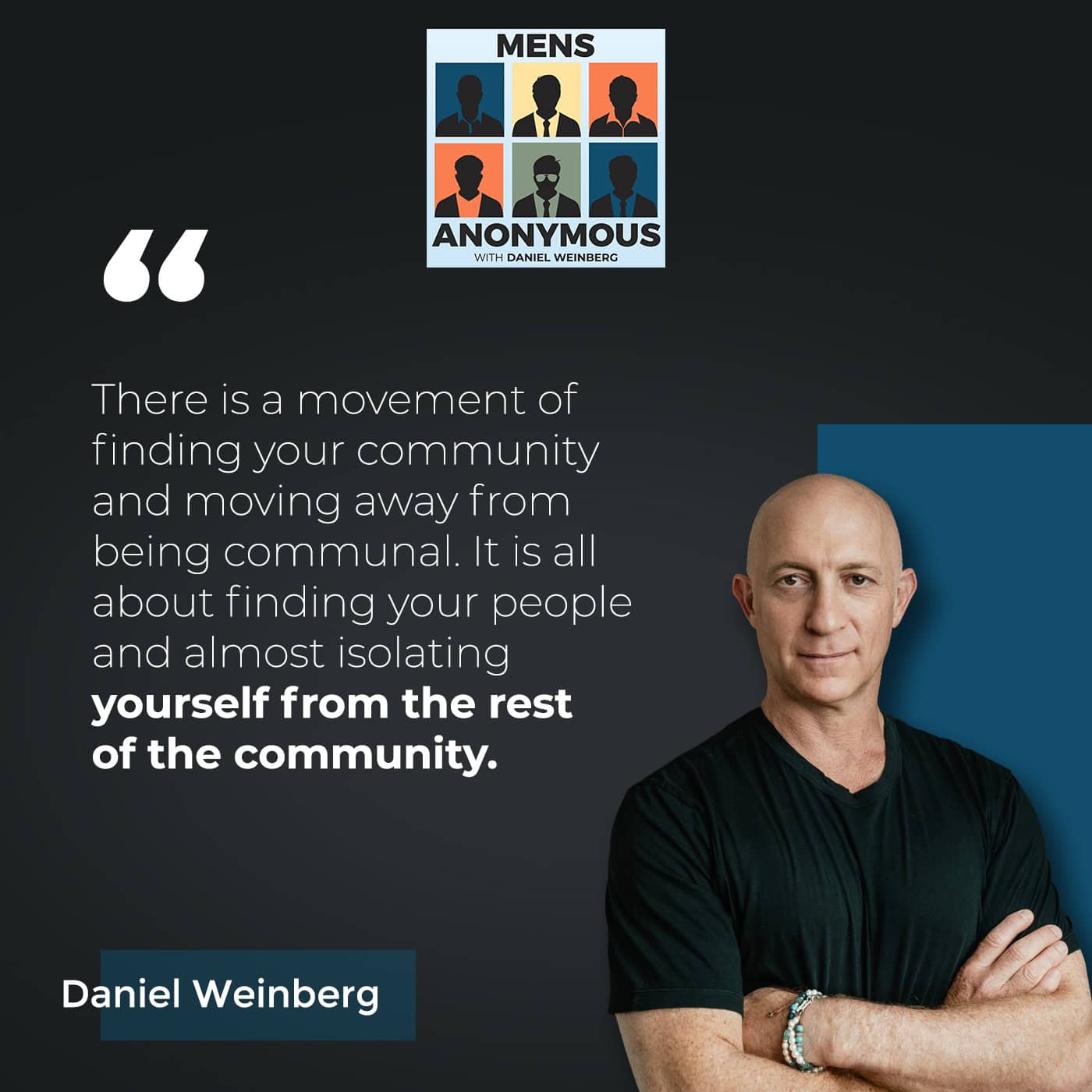
The Atlantic and other intellectual publications have talked about this sorting issue, which is prevalent.
Can you give me examples?
I will give you the number one example. If you look at the data that shows people moving from one place to the other, most people are transitioning from blue states to red states. California is bleeding people. This term political refugees come up into places like Idaho where I live for example.
What does that mean of political refugee?
It means people who don’t like the policies and the direction of their state’s politics.
That’s why they are leaving.
Look at the rise of Texas. Meta said they are considering moving their headquarters to Texas. Tesla did that as well. It’s because apart from regulations and all that stuff. It’s mostly regulations for them, but they want to move from the tax implications, the regulations, and this DEI environment that is shoved down their throats of a capitalist society.
I hate to use this term, but it is a socialist agenda that’s driving a lot of it. It’s veiled in equality and activism because if you drill down to the reasons a lot of folks want this stuff, it’s because they would like to see more of a socialist society. I grew up in Israel and Israel historically has been a socialist society and a welfare state. The United States has many socialist aspects, Medicare, Medicaid and so on. I’m not saying no to some of these policies. I’m saying call a spade a spade and state what your agenda is and what your views are.
Self-Love: What Men Can Do For Themselves
I want to ask you from the men’s perspective, so what I am observing. You are referring to that’s happening in the US and US being the mecca for all of these movements everywhere else lags behind. What I am observing is this belonging crisis is a real thing. I have had a couple guests on my show that talked about different locations. They are running different types of men’s groups, where men are coming out of the works. They have never done this stuff before and they are joining these men’s groups and you hear the positive effects that’s happening.
The crisis is real. There are some things you can do like start finding your community, etc. What tools or what suggestions would you give to men who are experiencing this and are a bit lost as to what they can do for themselves? What can they put in place? This idea of finding people in your community all sound good, but in general they are a bit like, “Should I join the running club down the road? How do I go about finding my community or my people where you get to feel net positive being you are getting a lot out of it.” It’s feeding your soul. It’s helping you get out of this isolation crisis. What can men do?
The holy grail. I will give you the keys without urging readers to buy my book but essentially, my book is a guide on how to do that. It’s the first guide based on my research that gives people a step-by-step process on how to find their sense of belonging. It’s why the subtitle is the Definitive Guide to Finding Belonging. Unlike many of the belonging gurus that talk about introspection and walking in the wilderness naked, literally and shunning the world and accepting who you are or meditating your way to belonging. That’s not the answer for the average person. I’m not going to tell you to do that.
This comes back to the belonging intelligence we kick things off with, and that self-actualization piece. It’s understanding how you find belonging first and foremost, to quote the stoics “know thyself.” Understanding your belonging archetype is the first step to knowing which belonging strategies you need to take.
Give me a strategy for your archetype.
I have an entire index of those in the book, but there are six categories, interpersonal relationships, micro interactions or casual encounters, group membership, self-esteem, contemplative practices and parasocial relationships. Interpersonal relationships are communal relationships. They are the relationships where there’s no give and take. There’s no transaction. It’s maybe your parents, spouse, kids, or best friend.
Dunbar has the circles, which everyone knows, the 140 Dunbar, but he developed multiple circles that start with yourself and God, then it moves out to these few people and a little more. That’s the first one. The second one is casual encounters. These are speaking to acquaintances and checking in with folks. There’s even things like going to regular places, waving to neighbors, going to your local bar and knowing the barista or running into people at work. Those are casual encounters or micro interactions.
Next is group membership. I have an entire way to select group membership. Again, it’s a 2 by 2 matrix. It’s based on the risk, whether it costs a lot of money or hard to attend but there is group membership, which includes going to events and festivals where this collective effervescence takes place because we are united with people. It’s going to religious services. As an example, concerts or comedy shows. Anywhere there’s a crowd, even protests. That’s another way, group membership.
Next are parasocial bonds and those are one to many relationships. That’s either an influencer who’s got a big following or an individual following an influencer. It’s relating to a character on a show or in a novel and so on. Next is contemplative practices. This is connecting with nature. It’s stargazing, it’s realizing you are a part of a bigger universe.
Finally, he’s a steam building, and these are things that strengthen your self-esteem. It can be like wearing brand names, driving a luxury car, or waving a flag. These are the things that give you self-esteem and strengthen your sense of belonging. Those are the paths. In the book, I talk about which paths you should take based on your belonging archetype.
Going back to your question, which is how to do it. It’s about understanding who you are, the paths, and what I call the belonging fuel tank. How much does each path give you? How much room do you have for more paths? It’s about applying belonging intelligence to strengthen these paths or add new ones because you need the skills to do that. Finally, it’s about environmental analysis to see what you can do environmentally in order to change your context.
Not just the content as I discussed earlier, but the context of where you are because where you are and all these other things, geographic location, educational background, and socioeconomic contributes to opportunities for belonging or takes away from the state your sense of belonging. That’s the framework. I lay this out with very helpful exercises available both in the book and digitally. That’s how you do it.
Your geographical, educational, and socio-economic background brings you to or takes you away from belongingness. Share on XHow Does The Search For Belonging Impact Relationships
Is this something you try and do on your own? If you are struggling with belonging, if you are struggling with trying to get yourself out of this, how does that affect you in your relationships? Whether it’s with your wife or partner. How does that affect your partner choice or your partner experience? What are the knock on effects if a lot of men are going through this? How does it affect them in the primary relationship?
First of all, I will say that being in a primary relationship that is healthy and secure is probably best for men because it helps them live longer and be happier. That’s scientific. I will also say that science also says that we need at least one social connection in order to live a longer and happier life. Robert Waldinger runs the longest study on longevity has identified social behaviors, and I’m one predictor of that.
You are right that interpersonal relationships, specifically with your spouse, is one of the most important things to feel belonging. One of the ways I like to describe belonging is that it’s a feeling of being home because you are seen as who you are. You are accepted as who you are, you experience belonging and therefore, validate your sense of belonging. It’s both an experience and a feeling. Going back to your question, many men are struggling to find mates. On dating apps for example, only the top certain percentage get the most likes, swipes, or whatever, so they are struggling.
Scott Galloway talks about that. He said like, “Only 10% of the men who are in there to get 90% of the hit rate.” It’s something like that.
I interviewed Professor Galloway for my book and I agree with him. The number one choice you can make is who you marry. I agree with what he said, the first-time men truly feel a true sense of belonging is when they have children because of that unconditional love they experience. I would say family is number one. When I went to PCS, which is like an inpatient psychological camp. I did that. When I got diagnosed, I realized I have a sex addiction and I’m bipolar. I was diagnosed with a bunch of stuff and I have been acting to address those things since.
One of the things I learned in PCS, is that if you imagine concentric circles, your number one circle is you and God. If you put that first, only then can you address your spouse. Only then your 2A is your spouse and your 2B is your children. Most people don’t understand that hierarchy, and they may be mixing things up. Maybe their children are first or their spouse is first. Unless, you are in your number one circle, you can’t take care of anything else. I would say for men, number one is take care of your number one circle because then you can’t give love to your spouse in the way that he or she may need.
The show before you, we talked about having a very healthy relationship. You need to first be able to practice self-love. You’ve got to fall in love with yourself first.
It’s very hard, especially for men these days. That’s right and I would say that when my wife and I were going through a tough time, I said, “This is impacting my mental health and I need to put myself first,” but then I realized I was the problem or at least part of it. What I have learned from the research is a lot of men focus on looks and that’s related to the self-esteem path of belonging. I would urge men to not put looks first.
It might be important for them, and attraction is very important because it leads to sex and sex is important for a good life. Anyway, whatever but you can’t over index on it. I would also say one more thing about men, slightly unrelated to your question. Men thrive in bigger groups because that’s when they feel like they can be vulnerable, which is why men’s groups are more successful or have been successful, and men also thrive in shared activities while women thrive in smaller circles and more intimate relationships. Again, scientifically proven.
I run a men’s group in Boise, Idaho. In the beginning, I got some flack. It’s like, “It’s an entrepreneurial group. Why are there no women?” I was like, “I don’t want any women,” because if you have women in the mix, the reality is that men’s drive for sex and attraction is going to take over. I knew that intuitively and it was the right choice.
Now we have 26 men. We have some criteria. If anybody wants to learn about it, I can send you the playbook. A few men who were part of our group and moved, started similar ones, Austin and LA for example. My point is, these men’s circles are good for men’s health in order to develop emotional intelligence.
How Dan Facilitates Men’s Groups
Can you talk us through the framework of how your men’s group works at a high level?
I talk about it in the book about how a lot of groups are not great and don’t contribute a sense of belonging because they usually have one criteria for joining. I’ll use the example of a running club. That’s interesting, but I’m not trying to run with somebody I don’t connect with. I call this the group qualifier test. The group qualifier test is saying, “You need at least 2 or 3 commonalities with group members in order to develop a sense of belonging that’s good for you and with that group.” That’s why ERG employee resource groups are dumb. It’s like, “All the Black folks or all the Jews should get together.” That doesn’t mean they have a lot in common other than ethnicity or religious identity.
Are you saying it needs to be well curated?
Yes, among several qualifiers.
The people are coming because they want to come because they are like, “It’s multidimensional. It’s not singularly focused.”
There are some key differences between identity and belonging. Usually, people mix that up. They are like, “We are all of the same color, so we all belong together.” That’s not true. For me, the qualifiers for the group are, 1) Men. 2) Entrepreneurial. They have their own business or they have a side hustle. They are business-oriented a little bit.
Number three, they follow our values around being of service, being kind, helping each other out and so forth. They follow our values, so they believe in that stuff. We have kicked people who don’t follow our values. Number four, they are relatively new to Boise. They have more of an incentive to get involved. Given that criteria, we add to that some standards around attendance. You have to attend at least one meeting a quarter. We have three.
You have to be engaged on different channels we get engaged. You don’t have to, but that’s very welcome. You also have to complete a one-on-one with another member once a month because that’s where relationships are deepened, follow our values, and stay for the duration of the event when you attend. If you don’t do any of those things, we track that and ask you to leave.
How many events a year do you have?
Sometimes we take the summer off and sometimes we don’t. We have 10 to 12 gatherings and then we have some special events like a holiday party with spouses and some other things. Even the fact we are a men’s group, and it’s in our name. It’s called Fellas and Fire Pits. It’s very clear we exclude women. The gatherings happen outside no matter the weather. There’s fire pits all around. Drinking is optional. There’s food. It’s manly and we embrace that. We don’t shy away from it.
What do you talk about?
There’s a structure. About half of the three-hour meeting is structured and it starts with getting food when you get there. Research shows that when there’s food, people are a little more vulnerable, so we have some food. People can grab a drink. We have non-alcoholic as well. I have seen that trend, especially in our group, alcohol declining, and then we circle up. We form a circle, we then ego around multiple rounds. The first round introduces themselves because people forget there are 26 members and only about half show up at every meeting.
It’s followed by wins or shoutouts to who helped you over the last month or what are some wins you had in your personal life. We then follow up with an answer to the heart warmer question, which can be something pretty deep. That is a platform for vulnerability and that follows with needs and leads. What do you need? What do you have to offer? How can we help and then we wrap up. The discussion around the heart warmer happens in smaller breakouts in order to embrace the vulnerability and intimacy. We then adjourn that portion of the meeting and it’s open socializing.
Tell me have you seen material impact on these men in their lives or in their relationships? Can you give me one example?
I don’t even know where to begin. The way we think about our group is it’s a platform for valuable relationships. I have seen so many examples of people connecting. Let me give you a couple of examples. The first one is that we have subgroups. We have a spiritual book club meeting that happens every two weeks around a specific book. Another one is we have Accountabili-buddy group where people review their goals for the year every month.
We have an athletic club where people can go do shared activities together. This one is focused on running, then we have a doing-thing group, which is whenever somebody wants to do an activity, they post it. We have a mountain very close. If it’s snow sports season in Idaho, we are like, “I’m going to the mountain, who wants to go? I’m going to this place or that place.” That’s a way we connect people.
Specifically, pretty much everybody in the group has commented about how it helped them in one way or another. Whether it’s being connected to someone they needed to meet for, but business reasons or personal reasons or it’s just showing gratitude for the group because they feel a sense of belonging. We run an annual engagement survey and look at the numbers. We measure engagement by belonging.
For example, I will look at the results in real-time of the latest survey. I can tell you that the belonging is about, on a scale of 1 through 10, please rank your sense of belonging in the group. Sixty-two percent rated it a 9 out of 10 and 15% rated it a 10 out of 10. The next one was a 6 out of 10, and that’s only three people. Ninety percent of the group says that it gives them a sense of belonging eight or above on a scale of ten.
Answering Rapid-Fire Questions
I want to thank you. I’m going to ask you five questions to finish up, but before I do, fascinating discussion. I feel like we could go on for hours here and I’m going to have to do some follow ups with you. it’s extremely valuable, the guide that you’ve put together and the ability to break it down and be able to explain it in a very digestible way. More importantly, with a whole lot of tools and takeaways of how you can keep optimizing effectively. That’s great stuff and well done. I’m looking forward to the next version, but I’m going to jump into the five questions I ask all my guests. Who would you like to say sorry to given the chance?
As I mentioned I’m a sex addict and I have been in recovery now for the better half of a year.
How do you know if you are a sex addict? How does one find that out? What makes someone go from a lot of sex to, “You are now a sex addict?”
I have gone through many groups. Most of them have been men. I have seen only 2 or 3 women in groups. It’s certainly something that plagues men more than women, and again, that’s natural and biological. To answer your question directly, there are several ways. Unlike other addict groups, our inner circle behavior, in other words, the behavior that contributes to a relapse is different for every person.
For some folks, it may be no masturbation, no pornography, or no sex with self. For other people, it might even be not looking at Instagram because that’s a source of temptation for many. Abstinence is different. Unlike alcoholism, which is no drinking. I would say people know they are a sex addict when their compulsion for sex, and there are multiple groups, Sex Addicts Anonymous, SAA, Sexaholics Anonymous, SA, Sex and Love Addicts Anonymous, SLAA, SPA, Sex and Porn Addicts. There are many groups.
You know you are a sex addict when there’s a compulsion for sex or sexual behavior that overrides your normalcy of human behavior. Also, addiction is a spiritual disease and recovery is a spiritual way of life because you have to admit that you are powerless over your addiction and your life has become unmanageable. That’s how you know if you are a sex addict and talking about it, because nobody else talks about it besides Terry Crews.
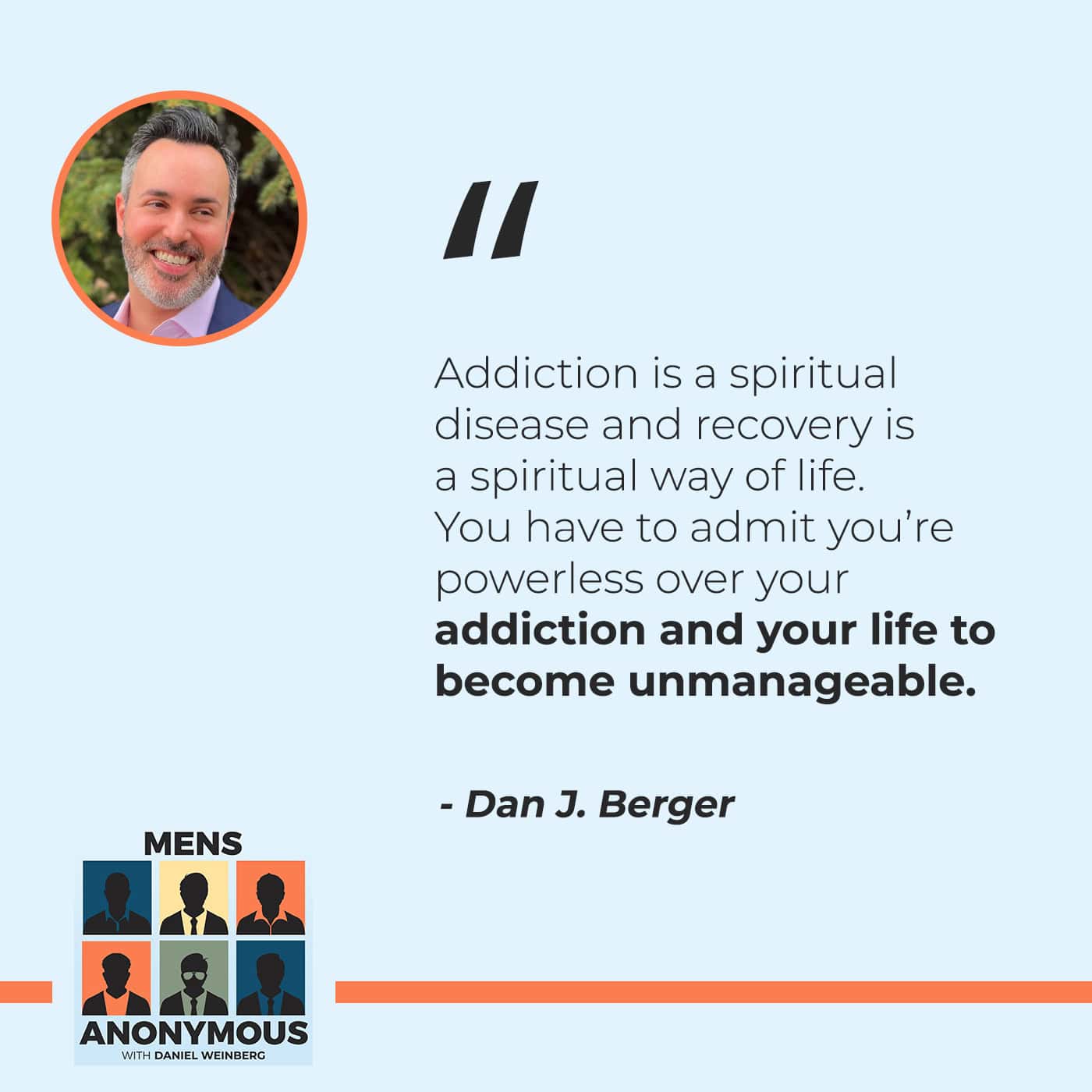
You will realize that you are a sex addict when you have a compulsion for sex or sexual behavior that overrides your normal human behavior. Share on X
Who do you want to say sorry to?
The reason I mention that is because step four of your recovery is creating an inventory of your character defects and it also includes the resentments or the poor ways you’ve treated people. For me, it’s many of the women I led on because early before my sex education, I was a love addict. I led many women on, and while my behavior has never crossed the line, I think that I emotionally manipulated women in ways that I regret.
What are you proud of being or doing in your life?
I will give two answers. From a business perspective, I’m proud of selling my company. America gave me an opportunity. I didn’t speak a word of English. According to the SBA, which is now giving loans to Jewish owned businesses, I’m a minority because they are treating Jews as minority owned businesses or Jewish founders and entrepreneurs. Certainly, a minority in the United States. I don’t care if people say that’s privileged.
I am 70% North African, so I take that for what it’s worth, that’s number one. Selling my company for $100 million after public school education, after immigration and so on. I would say personally getting married, given my addiction, my history with women, the many relationships I tried to have and failed, I’m so incredibly fortunate to be in a healthy partnership with Jen.
That’s a great story. When did you receive kindness while needing at most and expecting it least?
I received kindness when I shared with my wife that I’m a sex addict. I would say in fellowship and circles of recovery, “I always get kindness.” My sponsor gives me a lot of kindness. My sponsor, Luke. I accepted kindness also when I hired people. The fact they took a shot on me and the business I started is very kind.
What did your mother or father teach you that you frequently remind yourself of?
My father was useless. The one thing he taught me is hilarious. He taught me that what’s on the ground cannot fall. Whatever that means. That’s how useless he was. My mom taught me that every day is a school day and this was one of the core values at social tables at my last company. That contributed to my constant quest, no pun intended, to improve, develop, and strengthen my sense of belonging.
When you say school day, it’s because you are always learning.
That’s right. She would say in Hebrew, “Kel yum hu yum limudim.”
That’s very cool. The final one is, what’s your superpower?
I did this exercise once when this guy worked with me to find the one word that defines me, and my one word was unifier. I would say it’s being a unifier.
Dan J. Berger, thank you so much for giving me the time. I’m fascinated by the subject. I love how you’ve taken a scientific approach, a very pragmatic scientific approach to the situation. I look forward to continuing our discussions in the future. Thank you.
Thank you so much. I appreciate it. I had a lot of fun.
Important Links
- The Quest
- Dan J. Berjer
- Belonging Quest Quiz
- Sex Addicts Anonymous
- Sexaholics Anonymous
- Sex and Love Addicts Anonymous
- Sex and Porn Addicts Anonymous
About Dan J. Berger
 Dan J. Berger is the author of The Quest: The Definitive Guide to Finding Belonging, and the CEO of Assemble Hospitality Group. He previously sold his SaaS company, Social Tables, for $100M. He lives in Boise, ID with his wife and daughter.
Dan J. Berger is the author of The Quest: The Definitive Guide to Finding Belonging, and the CEO of Assemble Hospitality Group. He previously sold his SaaS company, Social Tables, for $100M. He lives in Boise, ID with his wife and daughter.

